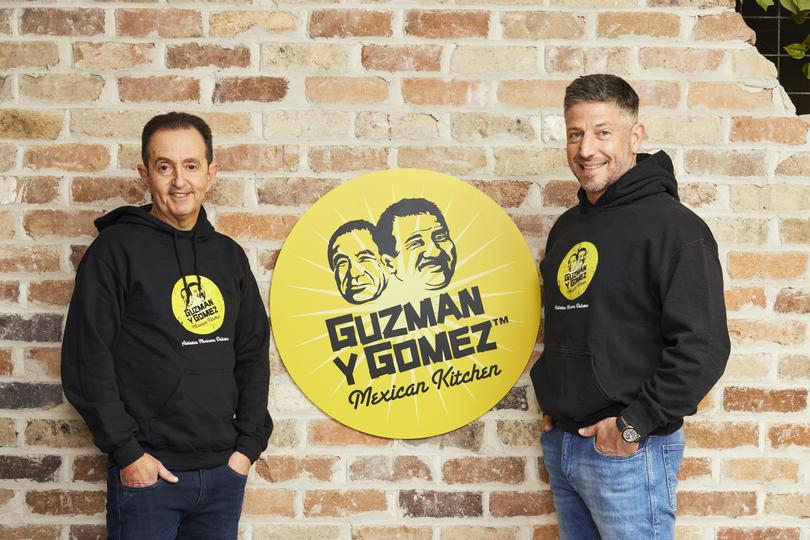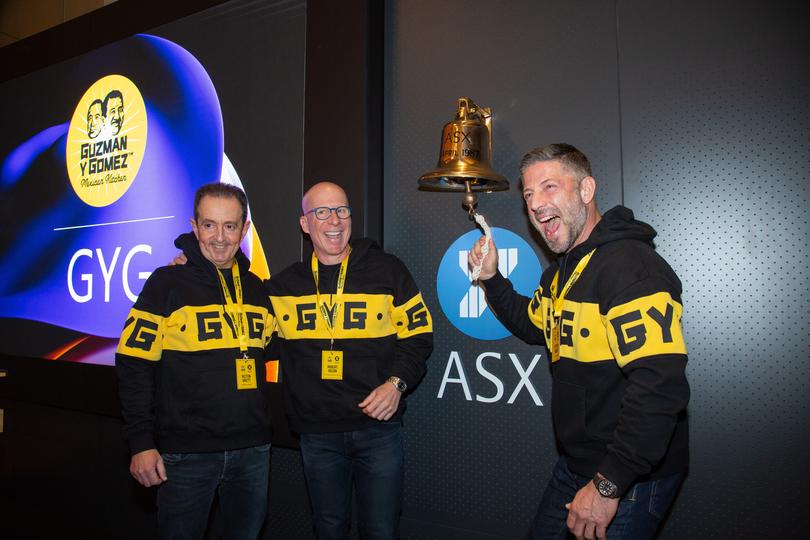Guzman y Gomez: Australia’s most valuable burritos hit the share market, but will the good times last?

Australia’s never seen burritos this expensive.
For a company that markets its ability to feed people fairly cheaply, Mexican-themed Guzman y Gomez certainly has some expensive shares. The shares are now priced at about $30 and value the entire company at nearly $3 billion.
It’s a meteoric rise for a company set up in 2006 in Sydney’s inner west by two New Yorker friends, Steven Marks and Robert Hazan.
Sign up to The Nightly's newsletters.
Get the first look at the digital newspaper, curated daily stories and breaking headlines delivered to your inbox.
By continuing you agree to our Terms and Privacy Policy.In 18 years, the company has opened more than 200 outlets — including 13 in Perth — and in a variety of formats: at universities, in food courts and drive-throughs.
The pair aspire to create the next McDonald’s — ubiquitous in an increasingly crowded environment for quick-service restaurants — with a stated goal of 1000 outlets in Australia alone. Guzman y Gomez has also had stores in Singapore since 2013, Japan since 2015, and Chicago since 2020.
Guzman y Gomez’s genesis is Mr Marks, a former hedge fund manager, and Mr Hazan, who had worked in fashion wholesale and retail and felt they could not find authentic Mexican food in Australia.
“What I realised when I moved there, a lot of Australians were having taco nights with Old El Paso, which to me, well, I’ve got an opinion on that, you know,” Mr Marks told The West Australian in a 2022 interview.
“Mexican restaurants were packed, and I thought the food was so poor . . . I was like, wow, if they actually got what Mexican food should be, man, they’re gonna love it.
“So my view was if we can make it cheaper and better than they can make it home, then they’ve gotta eat it at GYG, right?
“And we’ve sold millions, and it’s the same thing with our mini burrito for regular stuff. You can’t make it cheaper at home.”
Guzman y Gomez makes of being “clean” fast food, with menu items including breakfast burritos, scrambled egg bowls, tacos, nachos, nacho fries and enchiladas. It also promotes menu value, offering 10 menu items for less than $10, and its long-running $3 taco offer.
Guzman y Gomez launched on the Australian Securities Exchange on Thursday last week, with its share price surging to $30 after initially being bought for $22 apiece.
Hebe Chen, a stock market analyst at IG, said the company had “prepared an impressive growth story”.
But Ms Chen pointed out some of the optimism had appeared to wane, with the share price closing the week down nearly 5 per cent.
“Based on the financial report from the first half of the 2024 financial year, the company’s operating profit is barely above break-even at 1.6 per cent, thus raising imminent concerns about the business’s profitability — despite a rosy outlook projected over the next two decades,” she said.
Mr Marks is also not fazed by the crowded quick-service restaurant scene, even though his fast-growing company faces competition from the likes of Taco Bell, Zambrero, Mad Mex and Salsa’s.

Its expected rapid expansion is anchored around new restaurant openings, reaching more than 1000 in total in the next 20 years. By June 2026, it expects to be at 225.
In the meantime, what remains to be seen is how — and if — Guzman y Gomez can hold on to its hot reception, particularly as consumer spending is squeezed. Collins Foods, which operates a raft of KFCs and Australia’s Taco Bells and has a market valuation of $1.1 billion, is pausing its development of more restaurants, leaving them at 27 — four in Perth.
“Taco Bell’s value credentials provide a real point of difference to fast casual players in this segment, with new product innovation focused on key price points,” interim chief executive Kevin Perkins said this week.
“While the QSR sector is one of the most resilient, it is not immune to the ongoing cost-of-living pressures facing consumers.”
InvestorHub co-chief executive Ben Williamson said brands like Guzman y Gomez had a key advantage among listed companies “because anyone can understand their business model”.
“This market concept is why brands like Facebook, Google, and Amazon continue seeing extraordinary multiples,” he said.

“These businesses are fundamentally sound, and their revenue models are easy to grasp. Whether it’s food or online ad revenue, you don’t need a (chartered financial analyst) to understand how they make money, nor do you need any education on their brand.”
Mr Williamson said to compete long-term with brands like US behemoth Chipotle, which also sells Mexican fast food, Guzman y Gomez had “a difficult path ahead”.
”It’s important to note that stock performance is influenced by a multitude of factors, including company management, market conditions, and investor sentiment, among others,” he said.
Other analysts are also cautious on Guzman y Gomez’s prospects.
“Guzman looks expensive. We think the market takes a different view on Guzman’s long-run prospects — namely, how long the company can keep building stores that generate excess returns,” Morningstar analyst Johannes Faul told clients after the chain’s ASX launch.
Investors and market analysts alike will be eagerly awaiting Guzman y Gomez’s first results announcement, which will reveal how it has performed.
